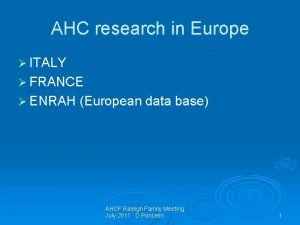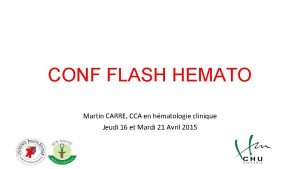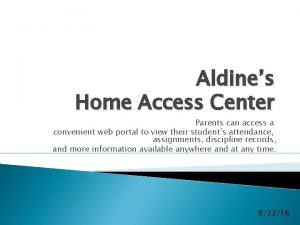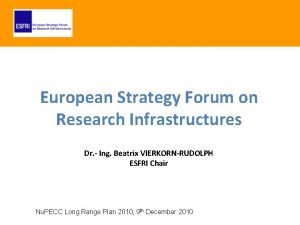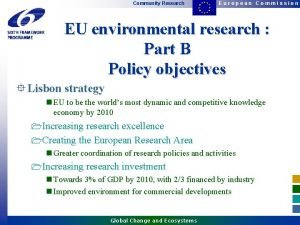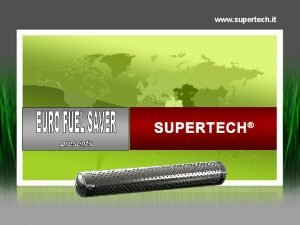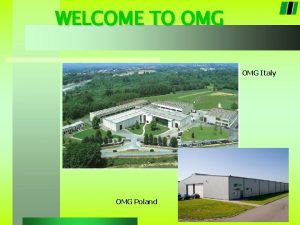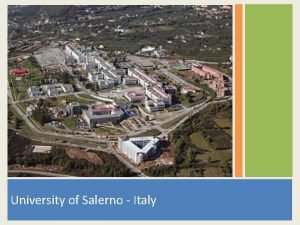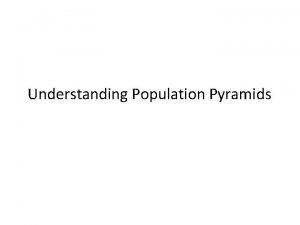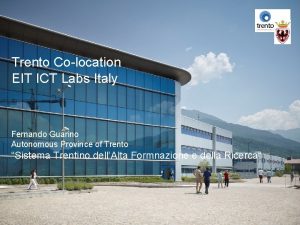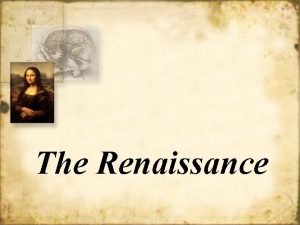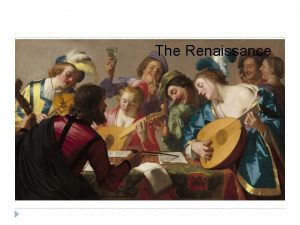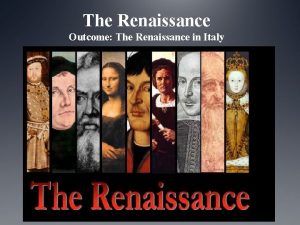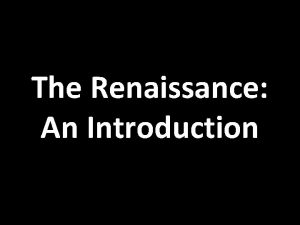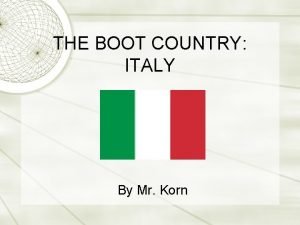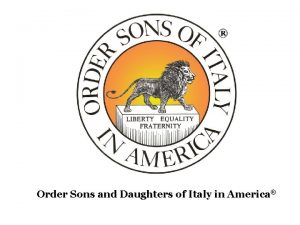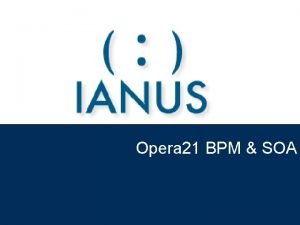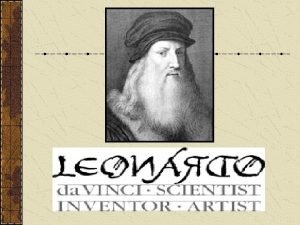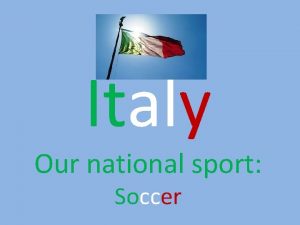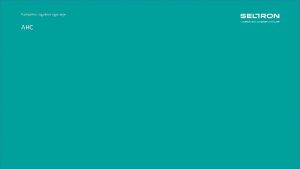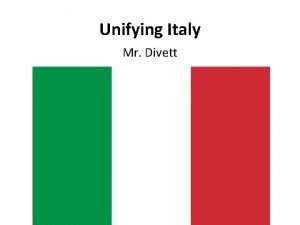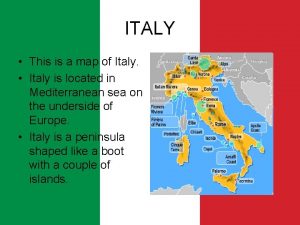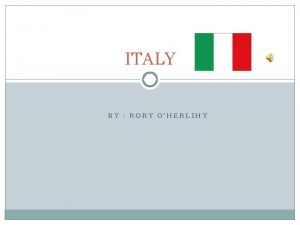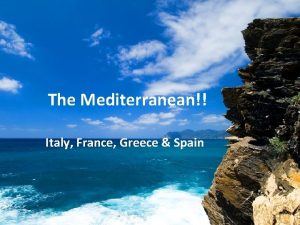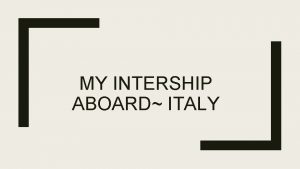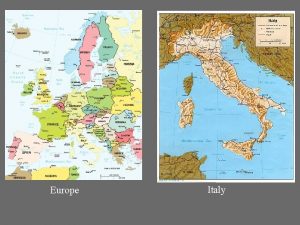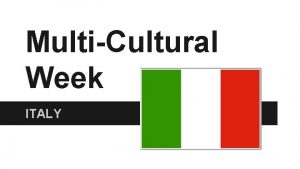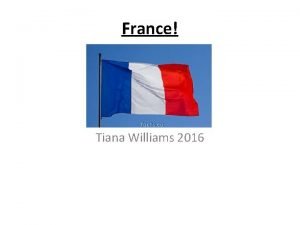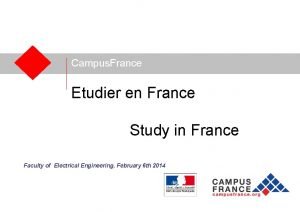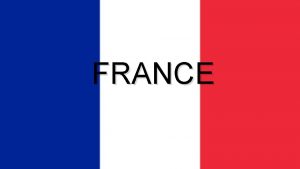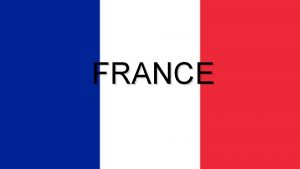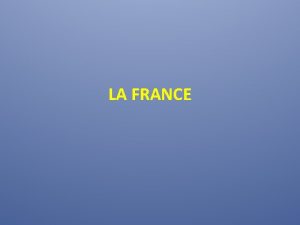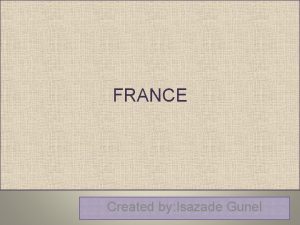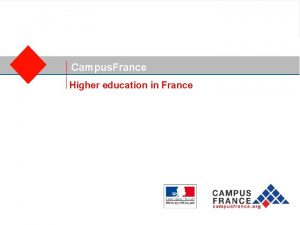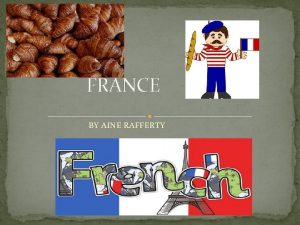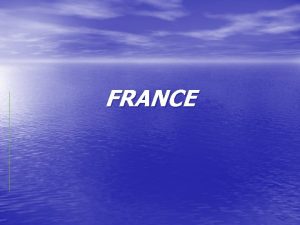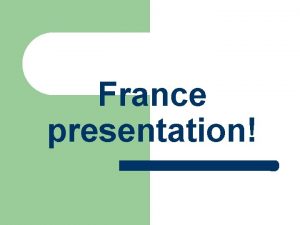AHC research in Europe ITALY FRANCE ENRAH European



























- Slides: 27

AHC research in Europe Ø ITALY Ø FRANCE Ø ENRAH (European data base) AHCF Raleigh Family Meeting July 2011 D Poncelin 1

AHCF Family Meeting Raleigh N. C. , 22 – 24 July 2011 The Italian Association A. I. S. EA: Activity report (2) Development of the research A. I. S. EA Onlus Italian Association for Alternating Hemiplegia Via Sernovella, 37 – 23878 Verderio Superiore (LC) IT Web. Site http: //www. aisea. org

Support to the Research The I. B. AHC Project n I. B. AHC – Biobank and Clinical Registry for Alternating Hemiplegia is a project coordinated and funded by A. I. S. EA Onlus, in collaboration with its Scientific Committee and with the Biomolecular Laboratory of the Scientific Institute “E. Medea” n I. B. AHC is composed of two main repositories, the Clinical Registry and the Biological Bank (Biobank), designed to collect, organize, keep and share both the clinical data and the biological samples (DNA, RNA and Cellular Lines) of the patients affected by AHC. n (40. 000 € for the development of the on-line Registry + 60. 000 € for the personnel costs + 30. 000 € for the data collection) 3

Support to the Research The I. B. AHC Project The I. B. AHC Biobank and Clinical Registry are n. Open to all research projects, with these characteristics: n n n Only on AHC Non lucrative Good quality and not duplicated n. Fully respectful of the privacy of the patients and of their rights to the information about the projects using their data and material and about the results, general and individual, of these projects. 4

The I. B. AHC Project The Public Website www. ibahc. org 38 validated cases currently available, complete with their clinical data and biological samples. The availability is kept updated on the I. B. AHC public website www. ibahc. org 5

The I. B. AHC Project The Public Website www. ibahc. org From the Documentation Area of the public website it is possible to download the Informed Consent Form for the participation of the patients, the Access Request Form for the researchers and other documents 6

Research Projects funded and supported by A. I. S. EA n n n “Alternating Hemiplegia of Childhood and Familial Hemiplegic Migraine: distinct entities or part of the same spectrum? ” by G. Casari, F. Martinelli – Boneschi, Milan (2004 – 2005, using the I. B. AHC Biobank) “Clinical Study of the Dysmorphic Features of Alternating Hemiplegia”, by G. Neri, F. Gurrieri, Rome (in progress, an article is in preparation for the publication) “Neurophysiological Dysfunctions in Alternating Hemiplegia of Childhood – a Study with Evoked Potentials” , by F. Vigevano, S. Rinalduzzi, Rome (2004 - 2005, published on the Scientific Journal Cephalalgia) 7

Research Projects funded and supported by A. I. S. EA n n “A Clinical study of the Movement Disorders in AHC”, by E. Fernandez Alvarez, Barcellona, N. Nardocci, Milan, A. I. S. EA Scientific Committee (completed, using the I. B. AHC Clinical Registry, results to be published) “Study of the Cerebral Ematic Flux in AHC using the Transcranial Doppler Sonography”, by E. Veneselli, M. Stagnaro – Genova (completed, funded by A. I. S. EA 15. 000 €, publication in progress) “Study of the excitability of the somatosensory system in AHC”, by M. Valeriani – Rome (completed, funded by A. I. S. EA 15. 000 €, publication in progress) “Molecular Basis of Alternating Hemiplegia of Childhood”, by M. T. Bassi – Bosisio Parini (LC) (completed, funded by A. I. S. EA 20. 000 €, using the I. B. AHC Biobank) 8

Research Projects funded and supported by A. I. S. EA n n n “International Classification of Functioning, Disability and Health in subjects with alternating hemiplegia of childhood”, by R. Borgatti, C. D’Aloisio, E. Ceppi(LC) (funded by A. I. S. EA 15. 000 €, published on "Disability and Rehabilitation", 2009) “AHC: a protocol for a Rehabilitation Follow-up and for a Neuropsychologic Study”, by R. Borgatti (in progress) “Sleep Study with Poligraphy”, by L- Nobili, C. Zucca (in progress) 9

Research Projects funded and supported by A. I. S. EA • Epigenetic Research (2008) by Doctors Kristel Van Geet e Kathleen Freson, Center for Molecular and Vascular Biology - Leuven, Belgium (using the I. B. AHC Biobank; second phase not yet started) • Genomic Analysis (2008) , by Prof. B. Dallapiccola, Dr. L. Bernardini, Institute CSS Mendel, Rome (functional study in progress, using the I. B. AHC Biobank and Clinical Registry) • Study of the GLUT 1 Gene (2010), Prof. Veneselli, Dr. Zara, Gaslini Institute – Genova (completed, using the I. B. AHC Biobank and Clinical Registry, publication in preparation) 10

Research Projects funded and supported by A. I. S. EA • Exome Sequencing by Prof. G. Neri and Prof. F. Gurrieri, University Cattolica, Rome (funded by A. I. S. EA – 15. 000 €, using the samples of 8 patients selected among the patients in the I. B. AHC Biobank and Clinical Registry according to their clinical and dysmorphic homogeneity, in progress) • Study of the Protocaderine Gene, by Prof. F. Vigevano, Dr. E. Bertini and Dr. N. Specchio, Child Hospital Bambino Gesù, Rome (approved for the use of the I. B. AHC Biobank but not yet started) 11

Research Projects funded and supported by A. I. S. EA n Quality of Life “Alternating Hemiplegia: a study of the paroxysmal episodes”, by E. De Grandis, M. Giannotta, E. Veneselli, F. Franchini, R. Vavassori (2011 – 2012) n n n aim of the study is to collect at a large scale, information about paroxysmal episodes (trigger factors, frequency, management, treatment) The collected data will be scientifically validated analyzed. Expected results: to better document paroxysmal episodes in AHC, to provide practical suggestions on how to manage episodes and to ameliorate the quality of life in AHC, as regards to treatment, psychological support, supportive and educational therapy, patients’ needs. 12

Research Projects funded and supported by A. I. S. EA n Quality of Life “Alternating Hemiplegia: a study of the paroxysmal episodes”, by E. De Grandis, M. Giannotta, E. Veneselli, F. Franchini, R. Vavassori (2011 – 2012) n n The data will be provided daily by the participating patients From the I. B. AHC public website www. ibahc. org, it is possible to download all the information about the Study and the Informed Consent Form for the participation The data can be provided either by entering them directly in the on-line I. B. AHC Clinical Registry or by filling a questionnaire (WORD and Excel formats) The Study is funded and coordinated by A. I. S. EA Onlus 13

Research Projects funded and supported by A. I. S. EA n Quality of Life “Alternating Hemiplegia: a study of the paroxysmal episodes”, by E. De Grandis, M. Giannotta, E. Veneselli, F. Franchini, R. Vavassori (2011 – 2012) One of the webforms to enter the data in the on-line I. B. AHC Clinical Registry The paper form to fill with the data and send to A. I. S. EA 14

Research Projects funded and supported by A. I. S. EA n Quality of Life “Alternating Hemiplegia: a study of the paroxysmal episodes”, by E. De Grandis, M. Giannotta, E. Veneselli, F. Franchini, R. Vavassori (2011 – 2012) n n n The patients can apply until 31 st December 2011 Currently 16 Italian patients and 6 European patients have started to collect the data of their paroxysmal episodes The official languages of the Study are Italian, English and French (available next September 2011) 15

Support to the Research Other activities • Organization of the WORKSHOP ON ALTERNATING HEMIPLEGIA, in collaboration with the Scientific Institute G. Gaslini (Genoa, 11 November 2011) • to involve the physicians in the participation of their patients to the research projects • To give an update about the current research projects and research lines • To define the best and shared procedures for the care of the AHC patients • Organization of the annual I. B. AHC Video-Session for the Validation of the AHC Diagnosis (Genoa, 12 November 2011) 16

AHC scientific research in France • Financial support by AFHA (French AHC Foundation), through call for projects in France initially, now extended to foreign projects (ex: Italian research. ) • Various fields could be elected like: • AHC knowledge (genetic origins, neurological dysfunction, epilepsy, diagnosis) • AHC health care (treatment, education needs, social aspects, quality of life) • AHC outcome (medical follow up, social needs, and evolution of AHC at adulthood) • Application form available on request to AFHA (www. afha. org - mail to d. poncelin@libertysurf. fr) • collaborative projects are very much appreciated • Maximum grant : 40. 000 € (57. 000 $) per project AHCF Raleigh Family Meeting July 2011 D Poncelin 17

AHC scientific research in FRANCE Psychosocial issues in AHC: (Dr Auvin – Paris): Ø Funded by AFHA : 19. 000 € Ø questionnaire filled in by French families (31) about * parents’ main concerns and feelings (diagnostic announcement, worries, information needs…. ) at time of diagnosis and at time of the study. * Social consequences for the family (parental couple, professional life, siblings, social activities…) Ø Results: answers analysed by neuropsychologist (J. Save) = poster presented during last european neuropediatric meeting in Crotia (May 2011) + scientific publication (in progress) AHCF Raleigh Family Meeting July 2011 D Poncelin 18

Main results from the inquiry Parental concerns l l l With no change : pain, dystonia, cognitive outcome at time of diagnosis: Hemiplegic spells, abnormal eyes movements, movement disorders, Later on: autonomy, behaviour , Parental most frequent needs: l Information on disease outcome l Role of early rehabilitation l Treatment options l Management of AHC daily life l Existence of a support group AHCF Raleigh Family Meeting July 2011 D Poncelin 19

AHC scientific research in FRANCE (Dr Nicole – Inserm Paris) Financial support from AFHA: 30. 000 € (French DNA bank) Study of the Glut 1 gene: negative results (pub 2011) Search for submicroscopic rearrangements linked to alternating hemiplegia of childhood by SNP-CGH arrays (poster presented Strasbourg 2010) Full Exome sequencing of DNA samples of AHC French selected patients. Not yet started due to excessive cost (5500 € each sequence) but will decrease significantly within 2 years), which is a hope for all of us; AHCF Raleigh Family Meeting July 2011 D Poncelin 20

ENRAH (European Clinical Data. Base) Ø Ø Financial support from European Community Clinical data collection from 157 European AHC patients Scientific publication (Brain Oct 2010) = data analysis Interesting points: l l Determination of a paroxysmal disability index (based on severity + duration + frequency of plegic and dystonic attacks) Determination of a non-paroxysmal disability index (based on global neurological impairement = walk , behaviour, communication, motor abnormalities, movement disorders, mental retardation ) AHCF Raleigh Family Meeting July 2011 D Poncelin 21

ENRAH (European Clinical Data. Base) Ø Some interesting results ( tendencies, not individuals, datas coming mainly from MEDICAL FILES, to be confirmed by US data base ? ) l There is no evidence of relationship between paroxysmal ( « attacks » ) index severity and non paroxysmal ( « cognition » ) index severity = 2 children with almost same number of attacks could have quite different cognitive impairement level l Reported non paroxysmal index of severity (neurological disability) remain constant with age, = a child with a good index will be usually an adult with good index (except for some individuals). This may suggest an initial (genetic ? ) level of severity of AHC, steady with age rather than a degenerative course. (however may be subject to environmental status) l Death reports (7 in the study) : usually associated with severe plegic attacks and epileptic seizures. No relationship with paroxysmal index (not more usual attacks), however non paroxysmal index (neurological impairement) is usually severe. AHCF Raleigh Family Meeting July 2011 D Poncelin 22

What future for AHC research ? Ø Here is my personal opinion having a look to the past years……… AHCF Raleigh Family Meeting July 2011 D Poncelin 23

4 requirements for AHC research to improve : Money (Fundraising) 2. Human material (DNA, tissues banks, clinical data bases, participation of families to studies) 3. Advanced technology (i. e full exome sequence) 4. Will and determination from scientists (quick + positive results not guaranteed in AHC ) Ø The future of AHC research will depend on the capacity for scientists and AHC organizations to combine at the same time those 4 criterias 1. AHCF Raleigh Family Meeting July 2011 D Poncelin 24

Is collaborative research an answer ? ? Genetic scientific approach (Full exome) seems to be the same for French (Inserm) and American (SLC). Ø several « clinical » research projects on AHC in progress in various countries (mainly USA and Italy) Ø Financial support from Families foundations -up to now: USA (400. 000 € ? ) , Italy (200. 000 €) , France (50. 000 €) Ø The question is : What is the best ? *international scientific collaboration to save time and money by sharing material (DNA), work and results ? or *keep on working independantly which leads to « competition » and may also speed up the research ? Ø The outcome of our AHC children will be linked to a clear answer to that question Ø AHCF Raleigh Family Meeting July 2011 D Poncelin 25

The end…… Ø As a conclusion for the future of AHC international research , and because we are here in the USA, I should say : I HAVE A DREAM……. . YES WE CAN……… AHCF Raleigh Family Meeting July 2011 D Poncelin 26

Thank you so much to all of you for listening. . AHCF Raleigh Family Meeting July 2011 D Poncelin 27
 Ahc france
Ahc france Ahc hemato
Ahc hemato Hac alidne
Hac alidne Isabey paris
Isabey paris Who marked when france sneezes europe catches a cold
Who marked when france sneezes europe catches a cold European strategy forum on research infrastructures
European strategy forum on research infrastructures European commission community research
European commission community research Supertech it
Supertech it Omg feletto
Omg feletto University of salerno italy
University of salerno italy Buffalo county sd population pyramid
Buffalo county sd population pyramid Fernando guarino
Fernando guarino The birthplace of the italian renaissance
The birthplace of the italian renaissance Where did the renaissance take place
Where did the renaissance take place Causes of renaissance
Causes of renaissance What started the renaissance
What started the renaissance Italy official name
Italy official name Important dates in italy
Important dates in italy Where did the renaissance begin
Where did the renaissance begin Boot country italy
Boot country italy Renaissance italy city states
Renaissance italy city states Order sons of italy in america
Order sons of italy in america Opera bpm
Opera bpm Leonardo de vinci was born on april 15
Leonardo de vinci was born on april 15 Rabbit island italy
Rabbit island italy Italy modas
Italy modas Italy is located in which continent
Italy is located in which continent National sport italy
National sport italy
